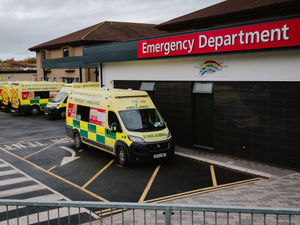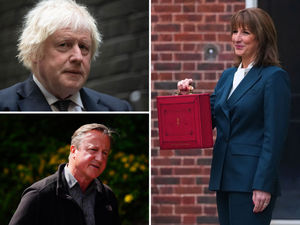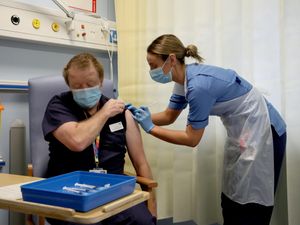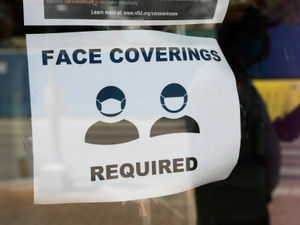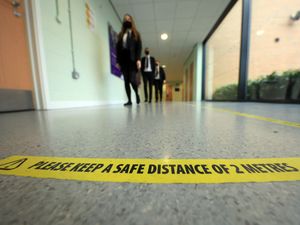Boris Johnson announces tightening of coronavirus rules after Omicron reaches UK
The Prime Minister’s address to the nation came after two cases of the new coronavirus variant were detected, in Nottingham and Essex.
Masks will be mandatory in shops and on public transport, contacts of Omicron Covid cases must self-isolate, and international arrivals will have to quarantine until they test negative after two cases of the concerning new variant were detected in the UK.
Boris Johnson warned the strain could reduce the effectiveness of vaccines as he announced a strengthening of England’s rules at a Downing Street press conference after the infections were identified in Nottingham and Brentwood, Essex.
The Prime Minister said the “temporary and precautionary” measures will be reviewed in three weeks, while the Government’s vaccine experts will be tasked with considering whether to extend booster jabs to all over-18s.
The UK Health Security Agency confirmed the two cases, which are believed to be connected and linked to travel to southern Africa, after genomic sequencing overnight.
The individuals and their households were ordered into self-isolation and targeted testing is being carried out in areas where they are thought to have been infectious.
Malawi, Mozambique, Zambia and Angola will face travel restrictions from Sunday, when they will join South Africa and five other neighbouring nations on UK red lists.
Mr Johnson said details of the “tightening up” of the mask rules will be outlined by Health Secretary Sajid Javid “in the next day or so”. It is unclear when all the regulations will be introduced.
But Downing Street said masks will become mandatory in shops and on public transport in the coming week, though they will not be required in pubs and restaurants.
To slow the “seeding” of the virus in the UK, Mr Johnson said anyone who enters the UK must now take a PCR test by the end of the second day of their arrival and self-isolate until they receive a negative result.
But the Prime Minister said border measures can “only ever minimise and delay the arrival of a new variant rather than stop it all together”, so all contacts with a suspected case of the new variant will have to isolate for 10 days, regardless of their vaccination status.
Scotland, Wales and Northern Ireland said they intend to mirror the border restrictions.
Mr Johnson said the new rules will be reviewed “in three weeks”, adding: “At that point we should have much greater information about the continuing effectiveness of our vaccines.”
The Prime Minister said he is “confident” Christmas “will be considerably better than the last”, which was largely cancelled for millions of people, but he refused to say whether further restrictions could be imposed.
Wary that many on the Conservative backbenches will be angered by the move, Mr Johnson said: “I very much hope that we will find that we continue to be in a strong position and we can lift these measures again, but right now this is the responsible course of action to slow down the seeding and the spread of this new variant and to maximise our defences so that we protect the gains we’ve worked for so hard.”
MPs are expected to be given a vote to approve the measures after they come into force, during which a number of backbench Tories may stage a rebellion. But it is thought unlikely Labour would oppose the restrictions, virtually guaranteeing that they will pass.
While the effectiveness of vaccines against Omicron is currently unclear, the Prime Minister said there are “good reasons for believing they will provide at least some measure of protection”.
Mr Johnson stopped short of bringing back the work from home guidance or extending the use of vaccine passports.
England’s chief medical officer Professor Chris Whitty said the Joint Committee on Vaccination and Immunisation (JCVI) will be tasked with looking at whether boosters can be extended down from the over-40s to the over-18s.
The experts will also consider whether second doses should be offered to 12 to 15-year-olds, and the waiting time before a booster jab could also be reduced.
Chief scientific adviser Sir Patrick Vallance said the country needs to “face up” to the possibility the variant will be a “major issue” if it turns out to be highly-transmissible and evades immunity.
He said that the existing booster programme is the current priority, but that vaccine manufacturers believe they can tweak their existing jabs to better counter Omicron “in about 100 days”.
The UK, Germany and Italy all confirmed the presence of Omicron on Saturday, after it was first found in Europe a day earlier in Belgium.
The detection of the cases came after Professor Sir Andrew Pollard, who helped create the Oxford/AstraZeneca vaccine, expressed optimism that existing vaccines will be effective at protecting against serious disease caused by the Omicron variant.
He also said it is “extremely unlikely” it will cause a “reboot” of the pandemic in Britain, as he offered tentative hope that the current jabs will still confer some degree of protection against the variant.
Sir Andrew, who also chairs the Government’s Joint Committee on Vaccination and Immunisation, said a new vaccine could be developed “very rapidly” if required because they now have a “well-oiled” process.
He told BBC Radio 4’s Today programme that most of the mutations in Omicron are in similar regions seen in other variants, adding: “At least from a speculative point of view we have some optimism that the vaccine should still work against a new variant for serious disease, but really we need to wait several weeks to have that confirmed.
“It’s extremely unlikely that a reboot of a pandemic in a vaccinated population like we saw last year is going to happen.”

